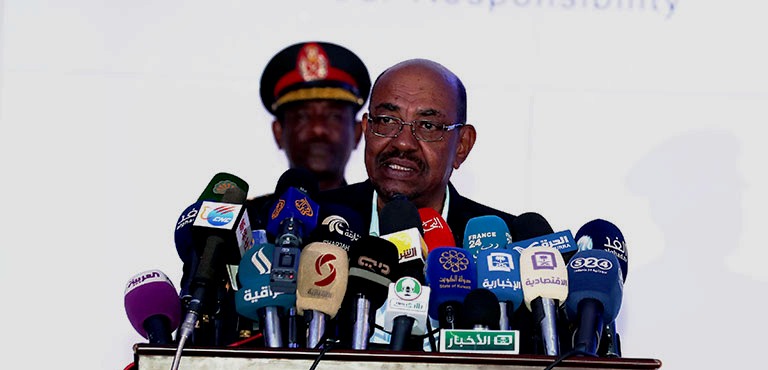Al-Bashir says ICC “colonial tool”, calls to establish African Court

April 2, 2017 (KHARTOUM) – Sudanese President Omer al-Bashir Sunday has proposed to establish an African court of justice describing the International Criminal Court (ICC) as “colonial tool” against Africa.
The ICC issued two arrest warrants against al-Bashir in 2009 and 2010 for alleged war crimes, crimes against humanity and genocide committed in Darfur. He is the first sitting head of state charged by the Hague-based court since its inception in 2002.
Al-Bashir, who addressed the First African Conference of Heads of Justice and Higher Courts in Khartoum, said: “Africans were convinced that the ICC is a colonial tool which requires the founding of an African court to achieve justice that is based on evidence, not fabrication and political considerations”.
He pointed the African judiciary has discovered that the ICC is “unjust and politicised in form and substance” against the continent which prompted the African Union to take a decision to collectively withdraw from the court.
The Sudanese President said the conference reflects Africa’s firm stance against the conspiracies, pointing it conveys a strong message that Africa is capable of changing the distorted image that was drawn by the colonial media about the continent.
He accused the supports of the Hague-based tribunal of “using double standards” and targeting African leaders, saying they are the ones who deserve to be tried.
Al-Bashir added that Africans are better able than others to assess themselves, saying “we don’t need a foreign or external assessment that serves specific agendas and uses criteria irrelevant to our values and customs”.
He underscored Sudan’s firm position in the fight against terrorism, human trafficking and smuggling and money laundering, saying his country is keen on human rights protection, good governance and peaceful transformation of power.
For his part, Sudan’s Chief-Justice Hayder Ahmed Dafalla called for establishing an African tribunal to prevent foreign interference and convey a message to the international community that Africa is capable of carrying out its judicial duties.
He said the existing judicial blocs have no geographical relevance to Africa, pointing they “targeted the symbols of sovereignty in the continent” and questioned the integrity of the African judiciary.
Dafalla further said time has come to launch an initiative to form an effective African judicial alliance to prevent foreign interference.
Sudan which is not a state member to Rome Statute of the ICC has been campaigning for an African withdrawal from the court.
The African Union constantly accuses the ICC of disproportionately targeting Africans. Several countries including Kenya, Sudan, Eritrea, Uganda, Zimbabwe and Libya have called for en mass withdrawal of African nations from the court.
But the court also has supporters in Africa. At an African Union summit meeting in July 2016, the Democratic Republic of Congo, Ivory Coast, Nigeria, Senegal and Tunisia were among the countries that opposed a Kenyan-led drive for a group walkout from the tribunal.
Established in 2002 to try war criminals and perpetrators of genocide never tried at home, the ICC has opened inquiries involving nine nations, including Kenya, Ivory Coast, Libya, Sudan, Democratic Republic of Congo, Central African Republic, Uganda, Mali and, most recently, Georgia.
(ST)
